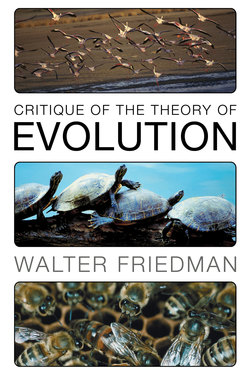Читать книгу Critique of the Theory of Evolution - Walter Friedman - Страница 16
На сайте Литреса книга снята с продажи.
10 : First-Generation Evolutionists
ОглавлениеEvolutionists often complain that, as far as the evolutionary theory is concerned, their opponents created a straw man and now merely attack him. The straw man is here, all right, but he was created by the evolutionists, as the history of the evolutionary theory shows.
Every serious science is based on a philosophical system that helps to interpret its experimental data and improve its methodology. For example, modern-day physics and chemistry are based on a philosophical system called positivism; in the past they were based on the doctrine developed by the German philosopher Immanuel Kant.
Biology is the only science that uses the currently defunct Hegelian philosophical system. Hegelian doctrine was not completely wrong, but it was replaced by more advanced philosophical systems, including positivism. This is a very interesting topic; however, a comprehensive discussion of the Hegelian philosophical system is beyond the scope of this book.
First generation evolutionists were firm believers in the Hegelian philosophical system, which comes as no surprise—at that time it was the most advanced philosophical doctrine. Positivism was only in its nascent state.
According to the main principle of Hegelianism, a process is bound to happen when the conditions favorable to its happening are present. The presence of favorable conditions is in itself a proof that the process is predetermined. Nothing in this definition indicates that the process should happen only once; on the contrary, the process will repeat itself as long as favorable conditions are present. For example, the presence of a gravitational field causes objects situated on the earth’s surface to remain there for an indefinite period of time; the process will repeat itself for as long as the earth exists. At a certain distance from the earth the condition known as weightlessness exists; weightlessness is also a persistent process that repeats itself permanently.
If the main principle of Hegelianism is properly applied, it predicts that the process that created the original cell will be repeating itself over and over because the elements known as the “building blocks of life,” or the constituents of the original cell, are always present. In other words, scientists should be able to observe the creation of an original cell on a constant basis. As everyone knows, this is not the case.
Naturally, the first generation of evolutionists tried to bypass this difficulty by saying that the presence of the building blocks alone is not enough to bring the original cell to life; something else is also needed to start the process of generation of the first DNA-like organic structure. What is this additional condition? There were several explanations depending on which evolutionists you talk to.
A majority of the first generation evolutionists used the concept of “vital force” in a feeble attempt to explain why there was only one original cell. Webster’s New World Dictionary gives following definition of vitalism: “the doctrine that the life in living organisms is caused and sustained by a vital force that is distinct from all physical and chemical forces and that life is, in part, self-determining and self-evolving.” No one really knows what a vital force is because it is a purely metaphysical quality that cannot be measured in any way; the absence of measurements makes it a nonexistent quality. Still, it would be interesting to know why, as evolutionists believe, it acted only once to produce the original cell. The explanation is just as ridiculous as is the concept of a vital force itself. It states that a primordial vital force gave itself up completely while giving life to the original cell, until there was nothing left!
A competing school of “thought” gave an entirely different explanation: in addition to the building blocks, favorable positioning of the planets in the solar system was necessary to bring the original cell to life. This positioning occurs once every 1010 years or so. This group of evolutionists stooped to the lowest level scientists could imagine: astrology.
Yet another group of evolutionists came to the conclusion that some sort of “nature magic” that acts only once was involved in all this; that group was also known for riding naked on a broomstick.
Without a doubt, the evolutionist will, upon finishing this chapter, cry—the straw man is down! But it was their predecessors who created the straw man to begin with.
